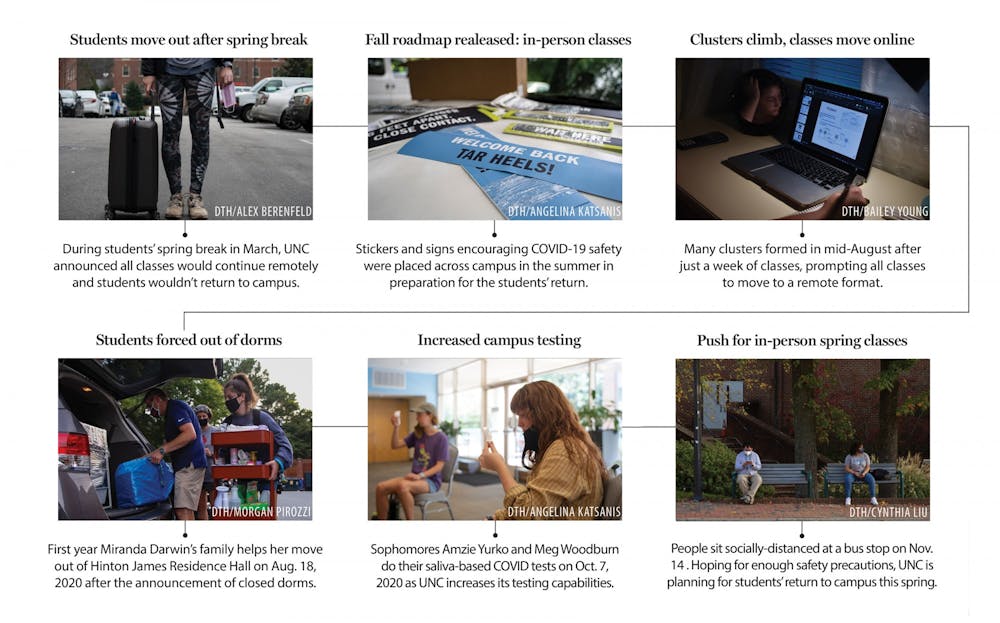- Aug. 14: clusters announced at Ehringhaus and Granville Towers.
- Aug. 15: cluster announced at Sigma Nu fraternity house.
- Aug. 16: cluster announced at Hinton James Residence Hall.
- Aug. 19: clusters announced at Morrison Residence Hall and Zeta Psi fraternity house.
- Aug. 21: cluster announced at Carmichael Residence Hall.
- Aug. 22: clusters announced at Craige Residence Hall and Alpha Delta Pi sorority house.
- Aug. 23: cluster announced at Avery Residence Hall.
- Aug. 25: cluster announced at Koury Residence Hall.
- Aug. 27: cluster announced at Cobb Residence Hall.
Aug. 16: National spotlight
As cases began to rise, the University gained national media attention. On Aug. 16, The Daily Tar Heel published an editorial labeling the school’s fall roadmap a “clusterf*ck.” News outlets including CNN, The New York Times and The Huffington Post turned to the University as an example of unsuccessful reopening for the country.
Aug. 17: The offramp
On Aug. 17, the University announced all undergraduate classes would transition to a remote online format beginning Aug. 19. Students were also given the chance to cancel their housing contracts without penalty.
The following evening, Aug. 18, Carolina Housing notified students via email that they should cancel their housing contracts within the week and return to their permanent home for the remainder of the semester. Students with outstanding circumstances including those involved with athletics or ROTC, and those who lacked safe or reliable housing, could apply to remain on campus.
Student employees of Carolina Housing were left wondering what this transition would mean for their jobs and salaries.
On Aug. 28, the University sent an email to students and community members outlining a new plan for updating case and cluster numbers. All new cases would be reported daily on the University’s COVID-19 dashboard and messages would no longer be sent to students via Alert Carolina.
Aug. 24-25: Class pause
While the offramp ensued, classes continued. Students advocated for a pause in classes to give on-campus students the opportunity to transition off-campus and into remote classes. On Aug. 20, two days after the start of fully-remote classes, the University announced all classes would be paused on Aug. 24 and 25 to give students the chance to adjust to the new changes to the semester.
By Aug. 24, the University’s COVID-19 positivity rate had surpassed 30 percent.
On Sept. 8, Carolina Housing announced it would close 14 residence halls, and two days later, student employees were notified they would lose their position on Oct. 30 in an attempt to reduce spending.
To get the day's news and headlines in your inbox each morning, sign up for our email newsletters.
Sept. 15: A roadmap to spring
With remote classes underway and reduced on-campus occupancy, the University turned its sights toward the spring. On Sept. 15, Chancellor Kevin Guskiewicz announced plans for a spring roadmap.
“Our planning efforts will seek input from multiple groups, including our public health and medical content experts, our roadmap implementation team, as well as the state and Orange County health departments, and the UNC System,” Guskiewicz said in an email to students.
The University also introduced a Campus and Community Advisory Committee, which is composed of undergraduates, faculty, officials and community members, and meant to give the greater University community a voice in the spring planning process.
Oct. 9: Wellness day
The University asked faculty to pause instruction on Oct. 9, in observance of World Mental Health Day and to give students a break.
The announcement came after many students called for a day off before the end of the semester. After UNC announced it would not cancel classes on Oct. 12, University Day, students and faculty expressed stress about being left without breaks for the rest of the semester.
Several students started a petition calling for a mental health break, receiving over 3,000 signatures. The petition called for just "one day for us all to close our computers," citing the lack of breaks in the condensed semester.
Oct. 23: Announcing spring plans
In a campus-wide email on Oct. 23, the University announced changes to the spring semester, including:
- The implementation of regular COVID-19 evaluation testing and mandatory re-entry testing.
- Availability of single-occupancy rooms for those living on campus.
- Five modes of instruction for courses, both in person and remote.
Instead of a spring break, the spring semester will include five wellness days on:
- Monday and Tuesday, Feb. 15 to 16.
- Thursday and Friday, March 11 to 12.
- Monday, April 5.
First-year student Gustavo Gonzalez, who was sent home at the start of the fall semester, said he does not trust that the University will be able to make the necessary changes for the spring.
“Honestly, everything's just really, really bad right now,” Gonzalez said. “It didn't go as planned for fall. I think it's probably just best if they just keep everybody at home."
In discussing future plans for the spring with the DTH, Provost Bob Blouin expressed an appreciation for students.
“I'm always optimistic about our students, the energy that they bring to this campus, the life that they bring to the classroom,” Blouin said. “And I know there's so many of our students who were disappointed that we were unable to fulfill our promise to them to welcome them back to a safe campus environment.”
university@dailytarheel.com





